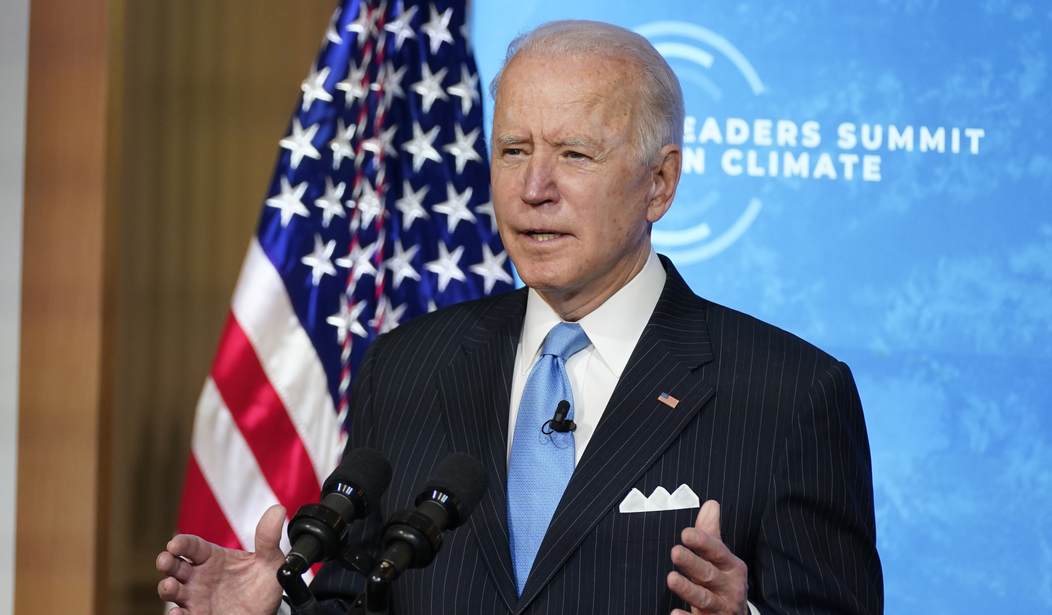Among right-wingers, there has been some delight about polls showing that Joe Biden's popularity at the 100-day mark is the lowest of any president since World War II. Oh, if you exclude Donald Trump. Undaunted by this detail, they note with satisfaction that Biden's approval rating, according to multiple polls, is somewhere between 52 and 57%. At this point in his presidency, Trump's approval was 40%.
Americans were far less partisan in the era of Eisenhower, Reagan, Bush and even Clinton than they are now. Large numbers of Democrats were willing to give high marks to Eisenhower when the economy was thriving, or to George H.W. Bush when we had just won a quick war, and a not insignificant number of Republicans approved of Clinton when we enjoyed balanced budgets and booming markets. But in recent years, negative partisanship has curdled our perceptions. One symptom of negative partisanship is the sharp decline in ticket-splitting. As the Cook Political Report's Amy Walter noted:
"After the 1992 election, for example, there were 103 split-ticket House seats; 53 that voted for George HW Bush and a Democratic member of Congress, and 50 that voted for Bill Clinton and a Republican member of the House... Post-2020, there are only 17, or just four percent of the House."
Starting with the presidency of George W. Bush, the partisan divide in presidential approval ratings went through the roof. Some 80% of Republicans expressed approval for Bush, but only 10% of Democrats agreed, and it was the reverse for Barack Obama.
The same pattern has been apparent in the past year. A Washington Post poll found that 49% of Democrats say the economy is doing well now versus only 18% who said that before the election. Among Republicans, 35% give the economy high marks today compared with 69% in September of 2020. Partisanship similarly colors peoples' perceptions of health care, race relations and other issues.
Recommended
So, in this environment, Biden's approval ratings are quite an accomplishment. That 33% of Republicans give him high marks for this handling of the coronavirus is a testament to something -- maybe reality can sometimes penetrate our epistemic bubbles?
Biden ran on unifying and healing the country. His inaugural address hit all the right notes, and his low-key handling of the office has served to relieve the national migraine that the Trump years caused.
Biden is clearly gambling that putting vaccines in people's arms and deposits in their checking accounts will be enough to transcend whatever kulturkampf the Fox News ecosystem is currently spinning up. And that may work out for him.
On the other hand, since he ran to be a national healer, there are some pitfalls he might want to avoid. Several observers I spoke to cited Biden's race rhetoric, for example, as unhelpful. David French, a conservative who wishes Biden well, recalled that verbal excess on this subject has been a weakness for Biden. In 2012, he told an African American audience that Republicans wanted to "put y'all back in chains." His recent comment on Georgia's election law as "worse than Jim Crow" was ridiculous (though the Georgia law was passed for bad faith reasons and did impose some new burdens while lightening others).
Biden is passionate about racial justice and has included a racial element in many of his proposals, including clean energy, infrastructure, agriculture and small business loans. His heart is in the right place, but is it politically savvy?
David Frum, citing a newly published study by Micah English and Joshua Kalla, agrees that toning down the racial appeals is advisable. English and Kalla tested whether pitching reforms as attempts to atone for past discrimination were effective or ineffective, compared with class-based or neutral appeals. Their results showed that couching reforms in the language of racial justice did nothing to increase support for the proposals even among Blacks and Democrats, but did provoke a backlash among Republicans. A class frame, by contrast, increased the likelihood that white voters would see the policy as "benefiting people like me." A class appeal was also linked with more respondents of all subgroups saying the policy was "fair."
There is no denying that racial discrimination has stained American history, but that doesn't mean that explicitly racial appeals are good politics. It wouldn't cost Biden anything to signal openness to Republican ideas. He could incorporate some of Sen. Tim Scott's police reform ideas for example. That might defuse some Republican resentment. (And even if it doesn't pacify Republicans, it's the right thing to do.)
Ben Wittes also stressed to me that the Biden administration should be meeting "on a weekly basis" with Republicans "if only for show." Biden met with a group of Republican senators to discuss the COVID-19 relief bill but has essentially disregarded Republican counteroffers. Negative partisanship may be at a boil, and yet 60% of Americans told The Washington Post that the president ought to be willing to make "major changes" to his proposals to gain Republican support, versus only 30% who thought he should try to push through his legislation as is.
Biden inherited a country on the verge of a nervous breakdown. Whatever criticisms one can lodge about this or that, he deserves our lasting gratitude for restoring decency, normal order and sanity to the business of governing. Whether it will be enough to reverse the slide into chaos remains uncertain, but defusing our deep mutual loathing, to the degree he can, should be a high priority.

























Join the conversation as a VIP Member